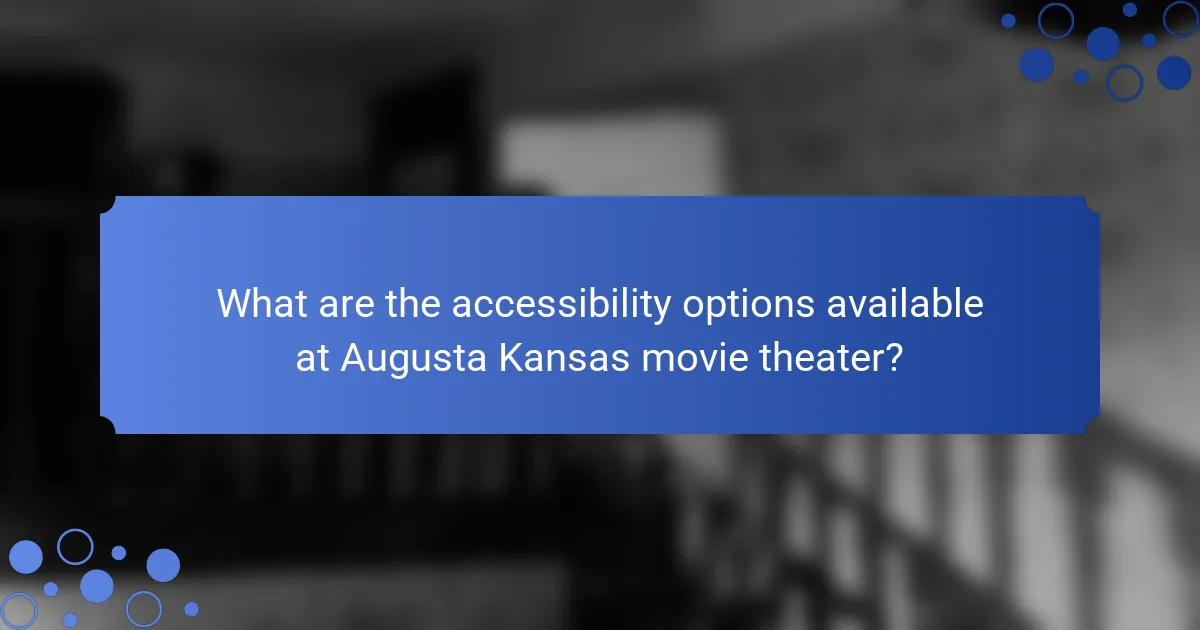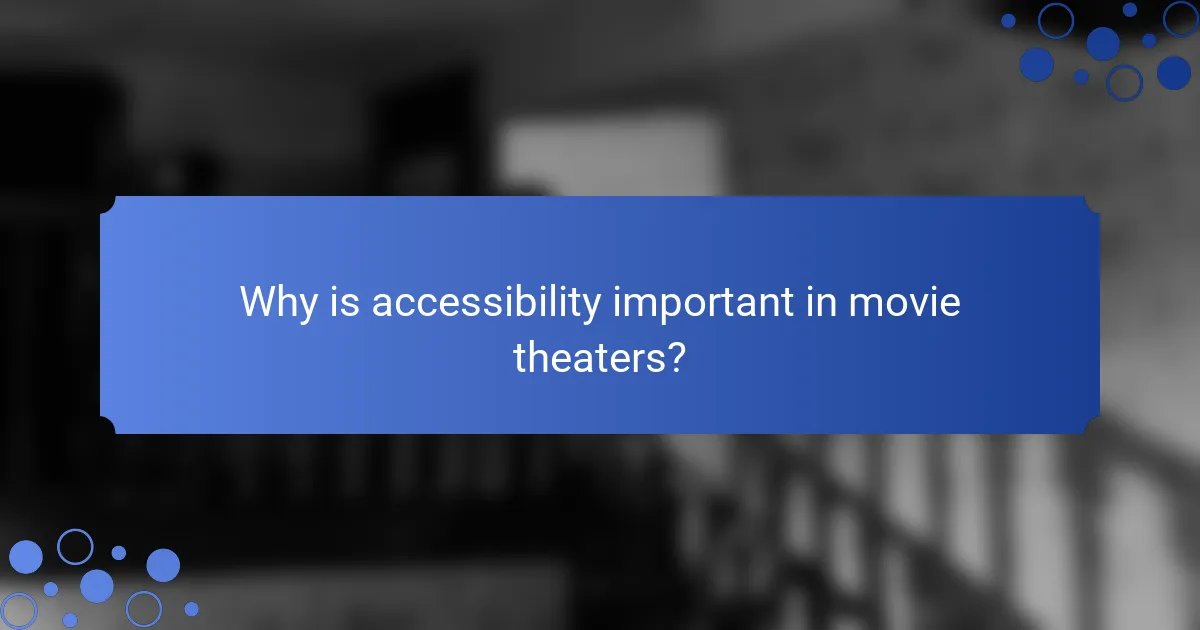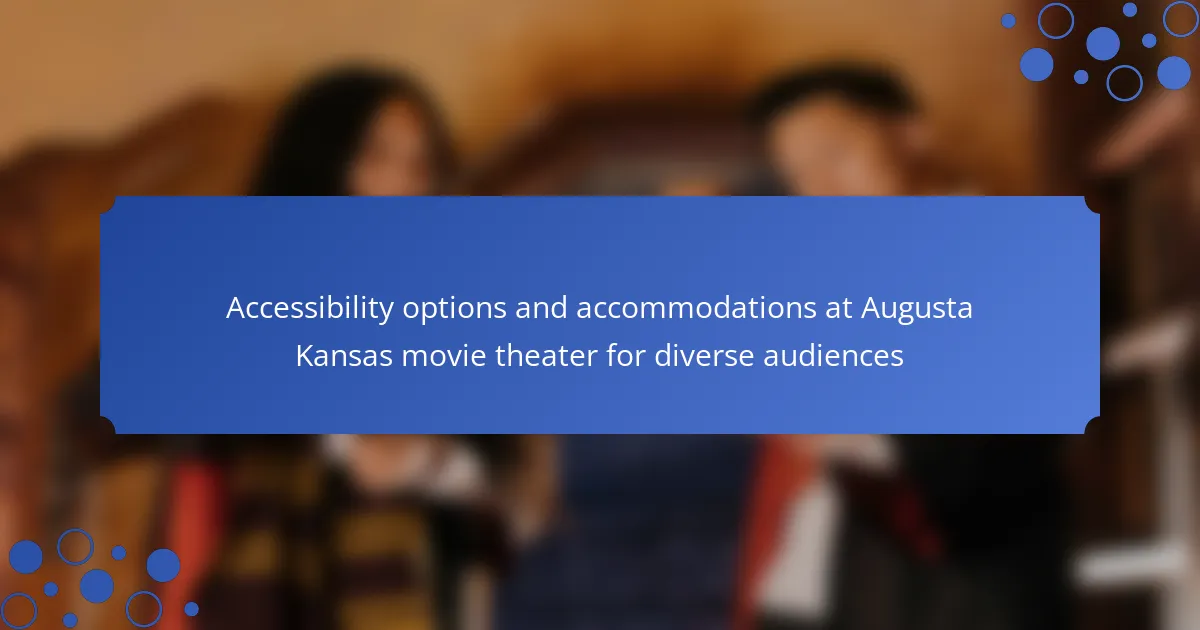The Augusta Kansas movie theater provides various accessibility options to ensure an inclusive experience for all patrons. Key features include wheelchair-accessible seating and restrooms, assistive listening devices for individuals with hearing impairments, and closed captioning for select films. Staff members are trained to assist guests with disabilities, promoting a comfortable viewing environment. The article emphasizes the importance of these accommodations in enhancing cinema enjoyment for diverse audiences and outlines how patrons can effectively utilize available services. Additionally, it highlights the significance of feedback in improving accessibility features for future visitors.

What are the accessibility options available at Augusta Kansas movie theater?
The Augusta Kansas movie theater offers several accessibility options. These include wheelchair-accessible seating and restrooms. Assistive listening devices are available for patrons with hearing impairments. The theater provides closed captioning for select films. Staff members are trained to assist guests with disabilities. These features ensure a comfortable experience for all audiences.
How do these options cater to diverse audiences?
Accessibility options and accommodations at the Augusta Kansas movie theater cater to diverse audiences by providing various features that meet different needs. These options include wheelchair access, assistive listening devices, and closed captioning services. Wheelchair ramps and designated seating areas ensure physical accessibility for individuals with mobility challenges. Assistive listening devices enhance audio for those with hearing impairments. Closed captioning services allow individuals who are deaf or hard of hearing to follow the dialogue. Additionally, sensory-friendly screenings accommodate individuals with sensory sensitivities by adjusting lighting and sound levels. These features collectively create an inclusive environment, allowing all community members to enjoy the cinematic experience.
What specific features enhance accessibility for individuals with mobility challenges?
Features that enhance accessibility for individuals with mobility challenges include wheelchair ramps, accessible seating, and designated parking spaces. Wheelchair ramps provide easy entry and exit for wheelchair users. Accessible seating allows individuals to sit comfortably without barriers. Designated parking spaces ensure proximity to the entrance. Additionally, restrooms equipped with grab bars and wider stalls accommodate mobility devices. Elevators and automatic doors further facilitate movement within the venue. Each of these features supports inclusivity and ensures a better experience for all patrons.
How are sensory-friendly screenings designed for those with sensory sensitivities?
Sensory-friendly screenings are designed to accommodate individuals with sensory sensitivities by modifying the environment and presentation. These screenings typically feature lower sound levels to reduce auditory overload. The lights in the theater are kept dimmed rather than completely dark, allowing for a more comfortable visual experience. Audience members are encouraged to move around and express themselves freely without the fear of disturbing others. Additionally, the screenings often exclude intense or jarring scenes that may trigger discomfort. Research indicates that these adjustments significantly enhance the viewing experience for individuals with sensory processing challenges. The goal is to create an inclusive environment where everyone can enjoy the film comfortably.
What accommodations are provided for hearing and vision impairments?
The Augusta Kansas movie theater provides several accommodations for hearing and vision impairments. For individuals with hearing impairments, the theater offers assistive listening devices. These devices amplify sound directly to the user’s hearing aid or headphones. Subtitles and closed captioning are also available for select films.
For those with vision impairments, audio description services are provided. This service narrates key visual elements during the film. Additionally, the theater may offer large print programs and braille signage. These accommodations ensure an inclusive experience for all audiences.
How does the theater support patrons with hearing loss?
The theater supports patrons with hearing loss by providing assistive listening devices. These devices amplify sound directly from the source, enhancing audio clarity for users. The theater also offers captioning services during screenings. This allows patrons to read dialogue and sound descriptions on screens. Additionally, staff are trained to assist patrons with hearing loss. They can provide information on available services and equipment. Regular maintenance of assistive devices ensures they are functional and effective. These measures improve the overall experience for patrons with hearing loss.
What tools are available for visually impaired guests?
Audio description services are available for visually impaired guests. These services provide narrated descriptions of visual elements during films. Assistive listening devices are also offered to enhance audio clarity. Braille menus and signage assist guests in navigating the theater. Staff members are trained to provide support and guidance. These tools ensure an inclusive experience for all attendees.

Why is accessibility important in movie theaters?
Accessibility is important in movie theaters to ensure all individuals can enjoy films. It allows people with disabilities to experience cinema without barriers. Accessible features include wheelchair seating, audio descriptions, and captioning services. These accommodations enhance the viewing experience for everyone. According to the Americans with Disabilities Act, public venues must provide equal access. This legislation supports the rights of individuals with disabilities. Ensuring accessibility fosters inclusivity and diversity in entertainment. It also expands the audience base for theaters, benefiting their business.
How does accessibility impact audience attendance and experience?
Accessibility significantly enhances audience attendance and experience. When venues provide accessible features, they attract a broader audience. This includes individuals with disabilities, seniors, and families with young children. Accessible seating, ramps, and assistive listening devices improve comfort and engagement. A study by the National Endowment for the Arts found that accessible venues see a 20% increase in attendance from disabled patrons. Additionally, positive experiences lead to repeat visits. Enhanced accessibility fosters inclusivity, creating a welcoming environment for all. This ultimately contributes to higher overall satisfaction and community support for the venue.
What are the benefits of inclusive environments for moviegoers?
Inclusive environments for moviegoers enhance the overall experience by ensuring accessibility and comfort for all individuals. These environments promote a sense of belonging for diverse audiences. They allow people with disabilities to enjoy films without barriers. Research shows that inclusive theaters increase attendance among underrepresented groups. This leads to higher ticket sales and revenue for theaters. Furthermore, inclusive settings foster community engagement and social interaction. They create opportunities for shared experiences among different demographics. In summary, inclusive environments benefit moviegoers by improving accessibility, increasing attendance, and enhancing community connections.
How can theaters improve their accessibility offerings?
Theaters can improve their accessibility offerings by implementing various strategies. They should provide wheelchair access throughout the venue. This includes ramps, elevators, and designated seating areas. Additionally, theaters can offer assistive listening devices for individuals with hearing impairments. Captioning services during screenings enhance the experience for deaf or hard-of-hearing patrons.
Training staff on accessibility awareness is crucial for assisting all guests effectively. Theaters can also provide sensory-friendly screenings, which cater to individuals with sensory sensitivities. Regularly seeking feedback from the community can help identify further needs. According to the Americans with Disabilities Act, theaters must comply with accessibility standards to ensure equal access for all.
What legal requirements exist for accessibility in public venues?
Public venues must comply with the Americans with Disabilities Act (ADA). The ADA mandates that facilities be accessible to individuals with disabilities. This includes requirements for parking, entrances, restrooms, and seating. Venues must ensure pathways are clear and ramps are available where needed. Signage must also be visible and understandable. The ADA sets specific guidelines for accessible design and construction. Non-compliance can result in legal actions and penalties. Local laws may impose additional requirements.
How does the Americans with Disabilities Act influence theater policies?
The Americans with Disabilities Act (ADA) mandates accessibility in theaters. This law requires theaters to provide accommodations for individuals with disabilities. Theaters must ensure wheelchair access, designated seating, and accessible restrooms. Additionally, the ADA promotes the use of assistive listening devices and captioning services. Compliance with the ADA is essential for theaters to avoid legal repercussions. The law influences theater policies to foster inclusivity and equal access for all patrons. Failure to adhere to ADA standards can result in fines and lawsuits. Overall, the ADA significantly shapes theater operations and customer service practices.
What are the consequences of non-compliance with accessibility standards?
Non-compliance with accessibility standards can lead to legal repercussions. Organizations may face lawsuits under the Americans with Disabilities Act (ADA). Financial penalties can also be imposed, which may include fines. Inaccessible facilities can result in loss of customer base. This can negatively impact revenue and brand reputation. Additionally, non-compliance can limit access for individuals with disabilities. This exclusion can lead to public backlash and loss of goodwill. Ensuring compliance promotes inclusivity and enhances community relations.

How can patrons make the most of accessibility options at Augusta Kansas movie theater?
Patrons can make the most of accessibility options at the Augusta Kansas movie theater by utilizing available services and resources. First, they should check the theater’s website for information on accessibility features. This includes wheelchair access, designated seating, and assistive listening devices.
Next, patrons can contact the theater in advance to inquire about specific accommodations they may need. The staff is trained to assist with various accessibility requirements. Additionally, arriving early allows patrons to familiarize themselves with the layout and available services.
Using the designated entrances and seating areas ensures a smoother experience. Lastly, patrons should provide feedback to the theater about their accessibility experience. This helps improve services for future visitors.
What steps should guests take to ensure a comfortable experience?
Guests should communicate their needs to the staff for a comfortable experience. Informing staff about specific requirements facilitates proper accommodations. Guests can check the theater’s website for accessibility features. This includes information on wheelchair access and assistive listening devices. Arriving early helps guests familiarize themselves with the environment. It allows time to locate accessible seating and amenities. Guests should also consider bringing personal comfort items. These may include cushions or blankets for added comfort. Lastly, guests are encouraged to provide feedback after their visit. This helps the theater improve its services for future audiences.
How can individuals request specific accommodations in advance?
Individuals can request specific accommodations in advance by contacting the Augusta Kansas movie theater directly. This can typically be done via phone or email. When reaching out, individuals should clearly state their specific needs. Providing details about the type of accommodation required is essential. For example, this may include wheelchair access, assistive listening devices, or sensory-friendly screenings. The theater staff is trained to assist with these requests. Early notification helps ensure that the necessary arrangements can be made. This process enhances the overall experience for diverse audiences.
What resources are available for patrons needing assistance on-site?
The Augusta Kansas movie theater offers several resources for patrons needing assistance on-site. These include wheelchair accessibility throughout the facility. There are designated seating areas for individuals with mobility challenges. Staff members are trained to provide support and guidance when needed. Assistive listening devices are available for those with hearing impairments. Additionally, large print programs and audio descriptions are offered for visually impaired patrons. These resources ensure that all guests have an enjoyable experience at the theater.
What best practices should be followed when utilizing accessibility features?
Best practices for utilizing accessibility features include ensuring clear communication about available options. Staff should be trained to assist patrons with disabilities effectively. Regularly test and maintain all accessibility equipment to ensure proper functionality. Provide detailed information about accessibility features on the theater’s website and promotional materials. Encourage feedback from users to improve services continuously. Collaborate with local disability organizations to enhance awareness and accessibility. Compliance with the Americans with Disabilities Act (ADA) is essential to meet legal requirements. These practices enhance the overall experience for diverse audiences.
How can guests provide feedback to improve accessibility services?
Guests can provide feedback to improve accessibility services through direct communication with theater management. They can fill out feedback forms available at the venue. Guests may also use online surveys sent via email after their visit. Additionally, guests can reach out through social media platforms to share their experiences. The theater often monitors these channels for suggestions. Providing specific examples of accessibility challenges can enhance the feedback’s effectiveness. This approach allows management to address concerns and implement necessary changes. Engaging with guests in this manner fosters a more inclusive environment.
What tips can enhance the overall moviegoing experience for diverse audiences?
To enhance the overall moviegoing experience for diverse audiences, theaters should implement various accessibility options and accommodations. Providing closed captioning helps those with hearing impairments follow the dialogue. Offering audio descriptions can assist visually impaired viewers in understanding visual elements. Ensuring wheelchair accessibility allows individuals with mobility challenges to navigate the venue comfortably. Staff training on inclusivity promotes a welcoming environment for all guests. Designating sensory-friendly screenings can cater to individuals with autism or sensory sensitivities. Flexible seating arrangements accommodate different group sizes and needs. Providing assistive listening devices enhances sound clarity for those with hearing issues. These measures collectively create a more inclusive moviegoing experience for diverse audiences.
The main entity of this article is the Augusta Kansas movie theater, which offers a variety of accessibility options and accommodations for diverse audiences. Key features include wheelchair-accessible seating, assistive listening devices, closed captioning, and sensory-friendly screenings designed to enhance the experience for individuals with mobility, hearing, and vision impairments. The article outlines how these accessibility measures promote inclusivity, improve audience attendance, and comply with legal requirements under the Americans with Disabilities Act. Additionally, it provides practical tips for patrons to maximize their experience while utilizing the theater’s accessibility offerings.
